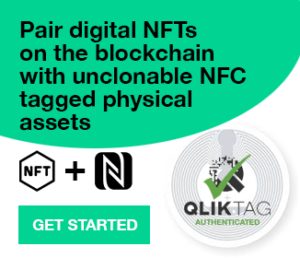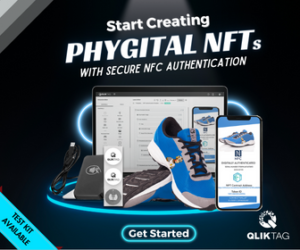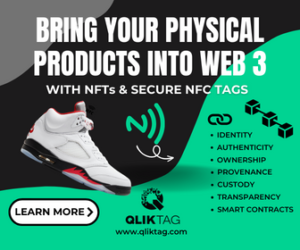NFC Technology for Digital Product Passports has been talked about considerably within industry events and workgroups developing standards and technologies that are related to the domain.
In the age of digital transformation, the need for transparency, accountability, and sustainability in supply chains has become more critical than ever. Industries such as fashion, electronics, pharmaceuticals, and automotive are under increasing pressure to verify the authenticity, origin, and lifecycle of products. This growing demand has led to the rise of digital product passports—digital records that provide a detailed, traceable history of a product’s journey from raw materials to the consumer. One of the most promising technologies for enabling these digital product passports is NFC (Near Field Communication).
NFC technology offers an innovative, secure, and user-friendly way to embed digital product passports directly into physical objects. This article will explore why NFC technology and NFC tags are particularly well-suited as data carriers for digital product passport and how they are shaping the future of sustainable supply chains.
What is NFC Technology?
NFC is a short-range wireless communication technology that enables data exchange between two devices when they are placed in close proximity, typically within a few centimeters. Unlike Bluetooth or Wi-Fi, NFC operates on very low power and doesn’t require device pairing, making it quick and seamless. NFC tags are small, passive data storage devices that can be embedded in a wide range of products, allowing users to access information stored on them simply by tapping their smartphones.
What is a Digital Product Passport?
A digital product passport is essentially a digital record or profile of a product that contains critical information about its entire lifecycle. This can include details about the materials used, the manufacturing process, transportation, certifications, and ownership history. The goal of digital product passports is to provide a transparent and immutable record of a product’s journey, enhancing trust, sustainability, and accountability in the supply chain.
Why NFC Technology is Ideal for Digital Product Passports
1. Seamless Connectivity and Ease of Use
One of the primary reasons NFC technology is well-suited for digital product passports is its ease of use. NFC-enabled smartphones are now ubiquitous, and consumers are already familiar with using them for tasks like mobile payments and access control. With NFC tags embedded in products, consumers can simply tap their smartphones to instantly access a wealth of information about the product’s origin, sustainability credentials, and more.
This frictionless experience makes NFC a user-friendly solution for brands and consumers alike. Unlike QR codes or barcodes, which require scanning apps and manual input, NFC allows for instantaneous data transfer, reducing barriers to adoption.
2. Security and Authenticity
In a world rife with counterfeiting, particularly in industries like luxury goods and pharmaceuticals, ensuring product authenticity is critical. NFC tags are inherently more secure than traditional barcodes or QR codes, which can be easily copied or replicated. Advanced NFC tags like secure unclonable NFC tags use cryptographic signatures that make them nearly impossible to clone. This makes NFC a powerful tool for anti-counterfeiting measures and ensures that digital product passports are authentic and tamper-proof.
Additionally, NFC tags can be paired with blockchain technology to further enhance security. By recording each interaction with the NFC tag on an immutable blockchain ledger, it becomes possible to create a traceable, transparent chain of custody for the product. This dual-layer of security—NFC’s cryptographic protection and blockchain’s immutability—ensures that the data stored in digital product passports is both trustworthy and immutable.
3. Durability and Flexibility
NFC tags are incredibly versatile and can be embedded into a wide range of materials, including fabric, plastic, paper, and metal. This flexibility makes them suitable for various industries, including fashion, electronics, and packaging. Additionally, NFC tags can be designed to withstand harsh environments, such as extreme temperatures, moisture, and physical wear, making them ideal for tracking products throughout their entire lifecycle.
For example, in the apparel industry, washable NFC fabric tags can be sewn into garments, providing a persistent digital link to the product passport even after multiple wash cycles. This ensures that information about a product’s origin, materials, and sustainability credentials remains accessible to consumers long after the point of sale.
4. Real-Time Data Updates
One of the unique advantages of NFC-enabled digital product passports is the ability to update data in real-time. Unlike static QR codes, which link to fixed information, NFC tags can be dynamically updated throughout the product’s lifecycle. This is especially valuable for industries like electronics and automotive, where products often undergo repairs, recalls, or upgrades. With NFC tags, manufacturers can easily update the digital product passport to reflect changes in the product’s status, ensuring that consumers always have access to the most up-to-date information.
Real-time updates also support more sustainable practices. For instance, consumers can access information about how to recycle or repair a product, extending its lifecycle and reducing waste. This aligns with growing consumer demand for sustainable, circular products.
5. Consumer Engagement and Brand Transparency
Today’s consumers are more concerned than ever about the sustainability and ethical sourcing of the products they purchase. NFC technology for digital product passports allows brands to engage directly with consumers by providing detailed information about a product’s environmental impact, certifications, and supply chain transparency. By simply tapping an NFC-enabled product, consumers can access its digital product passport, which might include information such as fair trade certification, carbon footprint, or even the working conditions in which the product was made.
This level of transparency fosters trust between brands and consumers and can serve as a powerful differentiator in competitive markets. Brands that prioritize transparency are more likely to build loyalty among increasingly eco-conscious consumers.
The Future of NFC and Digital Product Passports
As global regulations around product transparency and sustainability continue to evolve, the role of NFC technology in enabling digital product passports will only grow. The European Union’s proposed Digital Product Passport initiative, for instance, aims to make digital records of products mandatory for several industries, including electronics and textiles. NFC technology stands at the forefront of this movement, offering a secure, scalable, and user-friendly solution for embedding digital product passports into physical products.
In conclusion, NFC technology is particularly well-suited for digital product passports due to its ease of use, robust security, durability, and real-time update capabilities. As industries continue to prioritize transparency and sustainability, NFC-enabled digital product passports will play an essential role in creating more accountable and transparent supply chains. For brands looking to stay ahead in this rapidly evolving landscape, adopting NFC technology for digital product passports is not just an option—it’s a necessity.
By embedding NFC tags into products, businesses can empower consumers with greater transparency while ensuring product authenticity and fostering sustainability across supply chains.



